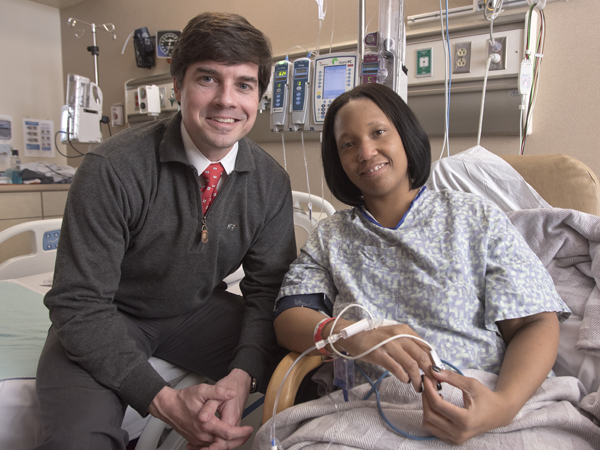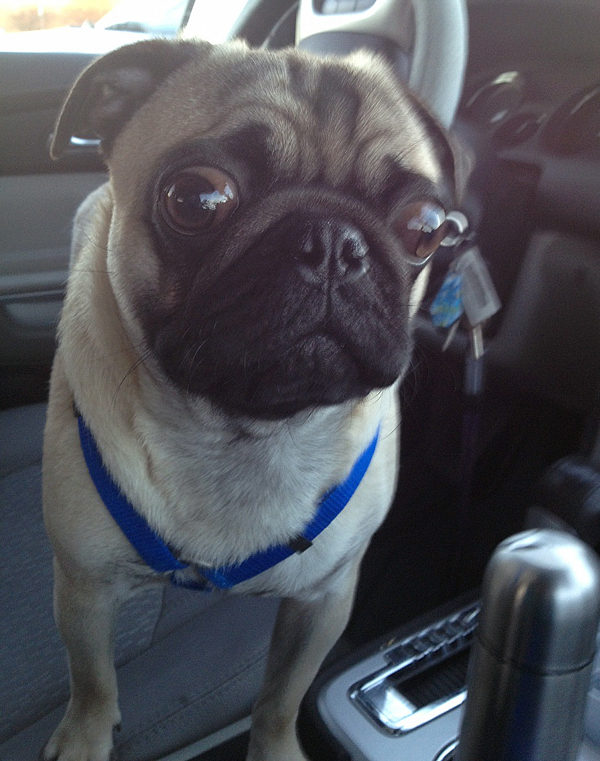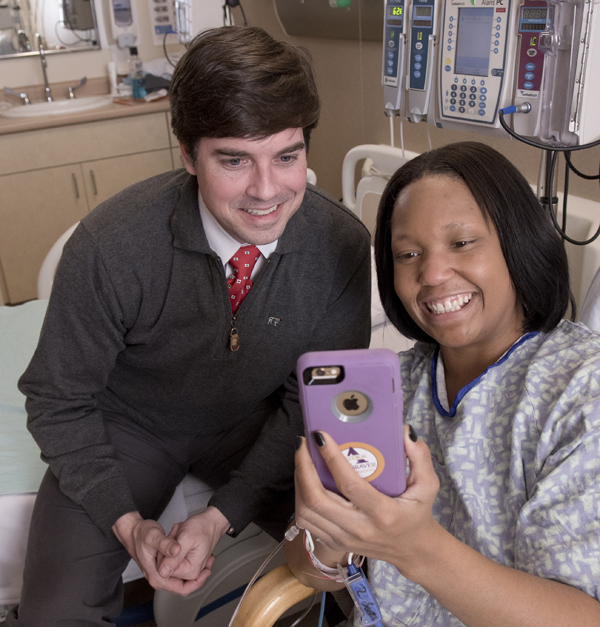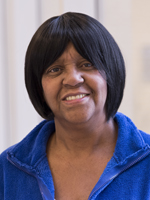New kidney, new life for SOD graduate

LaToya Colenberg-Eakins' little dog Deucebug might have to take a break from crawling into bed with her every night.
“He's going to be so sad,” Colenberg-Eakins said. Her pug won't be the only one who will miss out on a favorite ritual. Colenberg-Eakins no longer can enjoy venison. “No wildlife,” she said. “And my husband is a big-time hunter.”
The tradeoff, however, is a no-brainer. On Monday, Colenberg-Eakins turned her back on seven years of dialysis when she received a new kidney at the University of Mississippi Medical Center.
She lost a little. She gained so much.

“My incision hurts, but I feel awesome. The last time I got dialysis was last Friday,” Colenberg-Eakins, a 2011 graduate of the University of Mississippi School of Dentistry whose practice spans three cities, said less than 24 hours after her surgery. “With dialysis, you feel so heavy. Now, I feel light. It's weird. I'm hurting, but I feel so great.”
Dr. Mark Earl, assistant professor of transplant surgery, performed the procedure. “Her kidney function is outstanding,” he said on Wednesday, the day before her scheduled release. “She's right on track. End-stage renal disease patients who receive a transplant live longer and have a better quality of life generally than those who remain on dialysis.”
The Pearl resident's journey to a kidney transplant began when she was diagnosed at age 13 with focal segmental glomerular sclerosis, a serious disease that usually leads to kidney failure. In her second year of dental school, her kidneys failed completely and she began the rigors of dialysis five days a week.
It caused a temporary interruption in her classes and her pursuit of a longtime dream: to practice dentistry in Mississippi's rural communities. “In Fayette, there are no dentists - no one in general practice,” she said of the town where she grew up.
Because their teeth were decayed and neglected, people then and now “ended up with extractions. Their teeth are pulled. If they'd gotten earlier care, that wouldn't have happened. I want them not only to have healthy teeth, but to look better.”
That comes from personal experience.
As a young girl, “I hated my teeth. I had a bunch of spacing issues,” said Colenberg-Eakins, now 31. “People thought I was an angry person because I didn't smile. I got braces and a lot of reconstructive surgery, and that transformed me.”
A dental school rotation at the Jackson-Hinds Comprehensive Health Center locked in her decision to pass up an often-lucrative dentistry practice in a more urban area. “I'd ask a patient, 'How long has your tooth been hurting?' They'd say, 'Ten years.' ”
She returned to her roots, now practicing full-time at the Claiborne County Family Health Center and working part-time for a Jackson dental practice that also has an office in Hattiesburg. And as she became more exhausted, both from her disease and constant travel, she made it onto three kidney transplant waiting lists, the most recent a year ago in Mississippi.

“My daily routine has been to get up, drive to work, haul home and get on dialysis for three hours, sit up for 30 minutes to make sure I'm not bleeding, go to sleep, and the next day do it all over again,” she said. “I would normally get to bed at midnight or 1. I had to plan everything.”
“It's a big challenge for the overwhelming majority of patients just to manage their dialysis at home, much less be a busy professional,” Earl said. “That is incredible.”
Colenberg-Eakins almost lost hope, and so did her mother, as the wait stretched on and others were selected for a transplant. “I did get angry for a while a year ago, but then I realized how dangerous that was. I questioned God. But I apologized to him, and I found a peace.”
She and her mother, Betty Colenberg of Fayette, are women of faith. Betty's husband and LaToya's father, the Rev. Anthony Charles Colenberg, is a pastor, as is Colenberg-Eakins' husband, Elbert Eakins Jr.

“It hurt when you saw other people get a kidney, and then they messed it up,” Betty Colenberg said. “But then I said, 'Lord, give it to her in your time, not in my time.' ”
The time came early Sunday morning as her parents were driving to the church her father pastors in Natchez. A weary Colenberg-Eakins was in bed. “I almost missed the call. I had my phone on silent. I just happened to look at it,” Colenberg-Eakins said.
Her dad was the alternate contact. He fielded a call, then told his wife. “We turned around and came back,” Betty Colenberg said. “I've had a bag packed all this time.”
“They asked how long it would take me to get to UMMC. I told them eight minutes,” Colenberg-Eakins said. The donor's kidney was still hours from reaching the Medical Center when she was admitted at mid-morning. Then came her only fears: Would the organ be a suitable match given her rare blood type? Would it be healthy enough to be transplanted?
Her questions were answered when her health-care team came to her room at 6 a.m. Monday and rolled her to surgery. Before the anesthesia, she got to do something that most transplant patients don't.
“I saw the kidney. I was being nosy,” Colenberg-Eakins said. “It was so exciting. It was going to be my lifeline.”
That night, Colenberg-Eakins said, her new life kicked in. “It's a feeling to be in end-stage kidney disease, and it's gone,” she said.
“I've been in a lot of hospitals in my lifetime, and this by far has been my best experience,” she said of her stay at the Medical Center, where she was assigned her own transplant nurse. “If I need something, I push a button and they are here in a second. But I'm ready to get home. I've been a good patient.”
She's cleared to go back to work in four weeks, but she's taking eight as flu season gets into full swing. “I work around a lot of patients who are sick,” Colenberg-Eakins said. “The clinic has been very good to me. I'm blessed.”
There hasn't been time for Colenberg-Eakins and her husband to talk about how life will change. She's relieved that her husband and mother no longer must be her “dialysis partners,” with one of them present as a condition of home treatment.
“I look forward to not having to plan it into my day,” she said. “I look forward to just being free.”
On Saturday, Colenberg-Eakins did what thousands of people were doing: She bought a lottery ticket. “I just went across the river,” she said of a trip to Vicksburg to pay a bill.
Her ticket didn't match the numbers for Wednesday's $1.5 million Powerball, but she's not a loser.
“I did win the lottery,” she said. “The kidney lottery. We hit the jackpot.”


